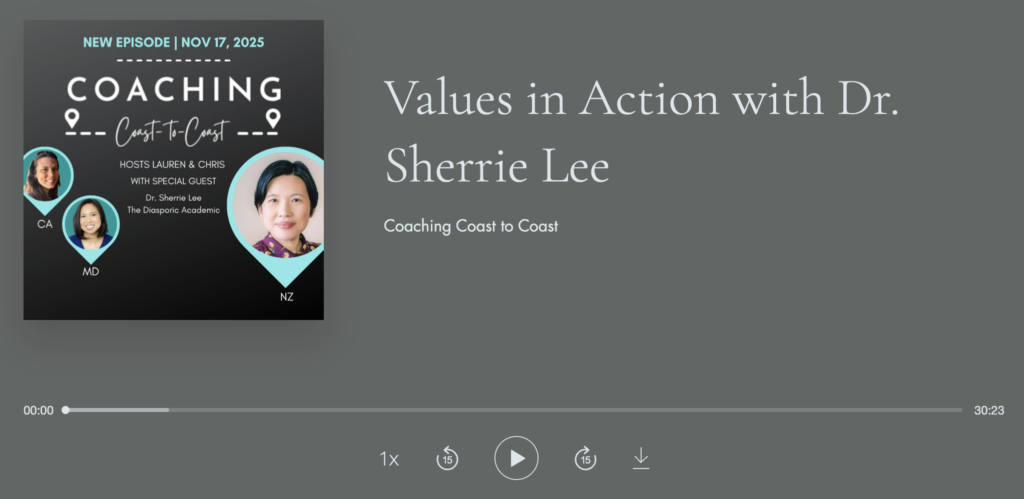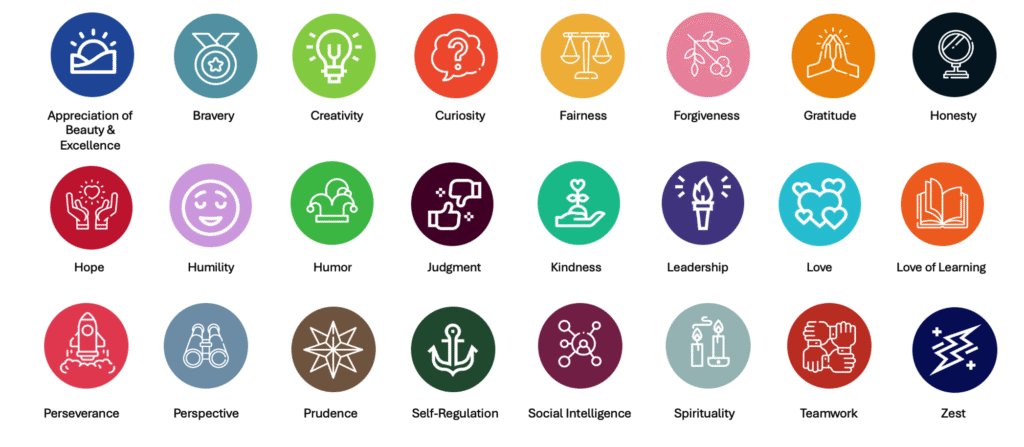Understanding who you are at your core can transform your career journey.
“Who am I?” It’s a question that sounds simple but can feel overwhelming, especially when you’re standing at the crossroads of your career. As a career coach, I’ve seen countless students and graduates get caught up in the external pressures of choosing the “right” degree or the highest-paying job, while neglecting the most important question: Who are you, and how do you want to contribute to the world?

This is where character strengths come in—and they might just be the missing piece in your career development puzzle.
Listen to the podcast based on this article: Discover Your Character Strengths for your Career Development.
Listen to the latest podcast Values in Action with Dr Sherrie Lee where I was guest on the Coaching Coast to Coast program

Continue reading the article ⬇️
What Are Character Strengths?
Character strengths are the positive traits of your personality that influence how you think, feel, and behave. Picture this: when you’re browsing the latest books at the library or showing genuine interest during networking conversations, you’re seeing your strength of Curiosity in action.
The research on character strengths began in the early 2000s during the rise of positive psychology. Led by Christopher Peterson and Martin Seligman (known as the father of Positive Psychology), this groundbreaking work resulted in the landmark textbook Character Strengths and Virtues: A Handbook and Classification and the VIA Survey which measures 24 character strengths.
These 24 strengths fall under six universal virtue categories that transcend cultures and nations:
- Wisdom (Creativity, Curiosity, Judgment, Love of Learning, Perspective)
- Courage (Bravery, Perseverance, Honesty, Zest)
- Humanity (Kindness, Love, Social intelligence)
- Justice (Fairness, Leadership, Teamwork)
- Temperance (Forgiveness, Humility, Prudence, Self-Regulation)
- Transcendence (Appreciation of Beauty & Excellence, Gratitude, Hope, Humor, Spirituality)

Why Understanding Your Strengths Matters for Your Career
Let me share a personal story. When my job was made redundant and I had to consider opportunities outside the industry I’d worked in for five years, I felt like I’d been knocked off a spinning top with no way to get back on. In my search for clarity, I discovered the VIA Survey.
While I wasn’t surprised by my results—I’d done plenty of personality assessments before—something was different this time. The simple but thought-provoking descriptions of each strength gave me a fresh perspective on who I was at my core. It validated thoughts I’d had about alternative career paths and even provided language I could use in cover letters and interviews.
Today, I work as a career consultant, and I can tell you firsthand that understanding and applying your character strengths is transformative for career development.
Here’s why it matters:
- Self-awareness is the foundation of career planning. Understanding your career direction, what you want to study, and how you want to develop professionally all starts with knowing yourself. Those are exactly the questions employers have about candidates: Who are you? Why do you want to work here?
- It helps you align career decisions with your values. A keen awareness of what makes you YOU helps align your career choices with your personal values and motivations, allowing you to shape a meaningful career narrative.
- It provides concrete material for job applications and interviews. Your character strengths give you specific, authentic language to use in cover letters and interview responses.
How to Discover Your Character Strengths
The most direct way to understand your character strengths is through the VIA Survey. What makes this assessment particularly valuable compared to other popular tools like the Gallup CliftonStrengths or MBTI assessment?
The VIA Survey is completely free. Unlike many career assessment tools that require payment upfront, the VIA Survey provides you with a comprehensive ranked list of all 24 character strengths at no cost. This makes it accessible to students and job seekers who might be managing tight budgets.
You get your complete strengths profile. Rather than focusing on just your top strengths (like some assessments do), the VIA Survey ranks all 24 strengths from highest to lowest. This gives you a fuller picture of your character profile and helps you understand not just what you’re strongest in, but also areas where you might want to develop.
It’s rooted in rigorous research. The VIA Survey is based on extensive scientific research in positive psychology, with validation across cultures and populations. The 24 character strengths framework has been tested and refined over two decades.
Extensive free resources available. The VIA Institute website offers a wealth of free resources that both individuals and career practitioners can use, including:
- Detailed descriptions of each character strength
- Research summaries and articles
- Practical exercises for applying your strengths
- Resources for educators and coaches
- Workplace applications and team activities
The basic survey takes just 10-15 minutes to complete and immediately provides your personalised character strengths profile. If you want deeper insights, you can choose to purchase more detailed reports, but the free version gives you everything you need to get started on your strength-based career journey.
In my coaching practice, I also recommend reflection exercises that help you understand your values, skills, and working style. The key is to approach this as an ongoing process of self-discovery, not a one-time assessment.
Character Strengths for Career Clarity
Knowing your signature strengths can help you clarify your career path and ideas. I recently worked with a student pursuing a Bachelor of Arts in Psychology and Criminology. They knew they didn’t want to be a psychologist but weren’t sure what else was possible.
When we reviewed their VIA results, we discovered that Love and Kindness were among their top strengths—qualities that were important to them in all aspects of life, including their future work. This insight sparked a conversation about potential roles in community services and various positions focused on helping people navigate difficult situations, including mental health challenges.
By connecting their natural strengths to career possibilities, this student found direction and purpose they hadn’t realised before with such clarity.

How Strengths Complement Your Technical Skills
Character strengths are also an important complement to your knowledge and skills. Your qualifications give you the knowledge and technical skills in your field. Your character strengths help you apply them effectively in the workplace.
For example, you might understand project management in terms of using spreadsheets, organising meetings, and tracking progress. But it’s your Social Intelligence that helps you communicate effectively with different stakeholders, your Love of Learning that helps you adapt and grow on the job, and your Perseverance that keeps you going when projects get challenging.
What Employers Are Looking For
Different roles and industries will emphasise some strengths over others. Here are some patterns I’ve observed:
- Innovation and business development roles value cognitive strengths like Creativity and Curiosity
- Customer-facing positions prioritise social strengths like Kindness and Teamwork
- Analytical and detail-oriented roles benefit from Perseverance, Prudence, and Self-Regulation
But here’s the important part: your particular top strengths shouldn’t dictate what roles you pursue. You have the capacity for all 24 strengths. A good fit between your signature strengths and your work environment enhances satisfaction and performance, but it’s not the only factor for success. Your knowledge, skills, interests, and the broader job market all play important roles.
This is especially relevant given the World Economic Forum’s Future of Jobs Report prediction that we’ll have multiple careers in our lifetime. With 92 million roles being displaced and 170 million new jobs created this decade due to technological development and economic shifts, understanding and applying your strengths becomes even more crucial for navigating this dynamic and ever-changing job market.
Key Takeaway and Next Steps
As Aristotle said, “Knowing yourself is the beginning of all wisdom.”
Your top five signature strengths represent who you are at your core. Applying these strengths more often will not only help you feel better and become more resilient—it will lead you to discover more meaningful and satisfying work.
Ready to Discover Your Strengths?
If you’re curious about your character strengths, here’s how to get started:
1. Take the VIA Survey to get a ranked list of your 24 character strengths.
2. Note your top five strengths which are your signature strengths.
3. Discuss your results with trusted friends. What resonates, what surprises you, and where have you seen each other demonstrate these strengths?
4. Download my character strengths reflection worksheet to support your reflection.
5. Consider professional support. Find a career coach or attend workshops to explore how to apply your strengths in your career journey.
Remember, career development isn’t just about finding any job—it’s about finding work that aligns with who you are and allows you to contribute your unique gifts to the world. Your character strengths are your roadmap to getting there.
About the author
Dr Sherrie Lee is a career coach who specialises in helping tertiary students and international professionals discover and apply their character strengths for meaningful career development. She runs workshops and provides one-on-one coaching to support individuals in their career journeys. Sherrie is a Professional Member of the Career Development Association of New Zealand (CDANZ) and leads the CDANZ Special Interest Group on Character Strengths.
